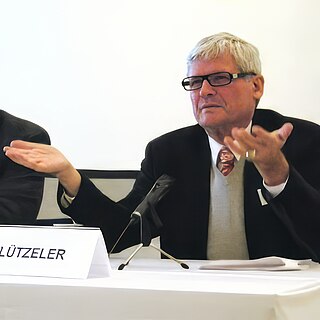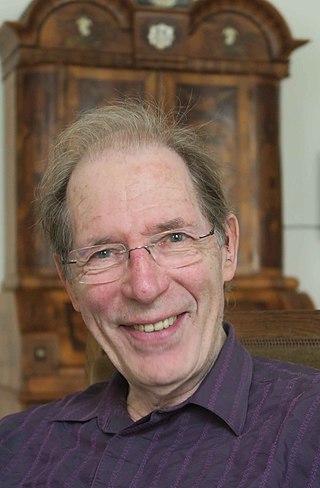
Helmut Rix was a German linguist and professor of the Sprachwissenschaftliches Seminar of Albert-Ludwigs-Universität, Freiburg, Germany.

Scandinavian studies is an interdisciplinary academic field of area studies, mainly in the United States and Germany, that primarily focuses on the Scandinavian languages and cultural studies pertaining to Scandinavia and Scandinavian language and culture in the other Nordic countries. While Scandinavia is defined as Denmark, Norway and Sweden, the term Scandinavian in an ethnic, cultural and linguistic sense is often used synonymously with North Germanic and also refers to the peoples and languages of the Faroe Islands and Iceland; furthermore a minority in Finland are ethnically Scandinavian and speak Swedish natively.
Baroness Stefanie Anna Hildegard von Schnurbein is a German literary scholar, and Professor of Modern Scandinavian Literature at the Humboldt University of Berlin.
Georg Graf was a German Orientalist. One of the most important scholars of Christian-Arabic literature, his 5-volume Geschichte der christlichen arabischen Literatur is the foundational text in the field.

Franz Hettinger was a German Catholic theologian.
Roberto Simanowski is a German scholar of literature and media studies and founder of dichtung-digital.

Paul Michael Lutzeler is a German-American scholar of German studies and comparative literature. He is the Rosa May Distinguished University Professor Emeritus in the Humanities at Washington University in St. Louis.
Joachim Gnilka was a German Roman Catholic theologian, New Testament scholar, exegete, and professor.
Rudolf Schnackenburg was a German Catholic priest and New Testament scholar. Joseph Ratzinger referred to him as "probably the most significant German-speaking Catholic exegete of the second half of the twentieth century."
Irma Wehgartner is a German Classical archaeologist.
Matthias Steinhart is a German Classical archaeologist.

Samica is a multilingual interdisciplinary scholarly book series focused on the languages, literatures and cultures of Sápmi and published by the University of Freiburg. The first volume was published in 2014. The series editors are the literary scholar Thomas Mohnike and the linguists Michael Rießler and Joshua Wilbur.

Jürg Thomas Stenzl is a Swiss musicologist, and university professor.

Michael Rießler, also transcribed Michael Riessler, is a German linguist and professor at the University of Eastern Finland since August 2020.
Frank-Rutger Hausmann is a German Romanist and historian.
Aasta Nielsen was a Norwegian actress.
Thomas Birkmann is a German philologist who specializes in Germanic studies.
Klaus Böldl is a German philologist who specializes in Old Norse studies. Böldl was born in Passau and studied Nordic philology, German philology and comparative literature at the universities of Munich and Lund University. Böldl received his Ph.D. in philology at Munich in 1999, where he completed his habilitation in 2005. Since 2007, Böldl has been Professor of Scandinavian Medieval Studies at the Nordic Institute of the University of Kiel.
Fritz Paul is a German philologist who specializes in Scandinavian studies.

Klaus von See was a German philologist who specialized in Germanic studies.








